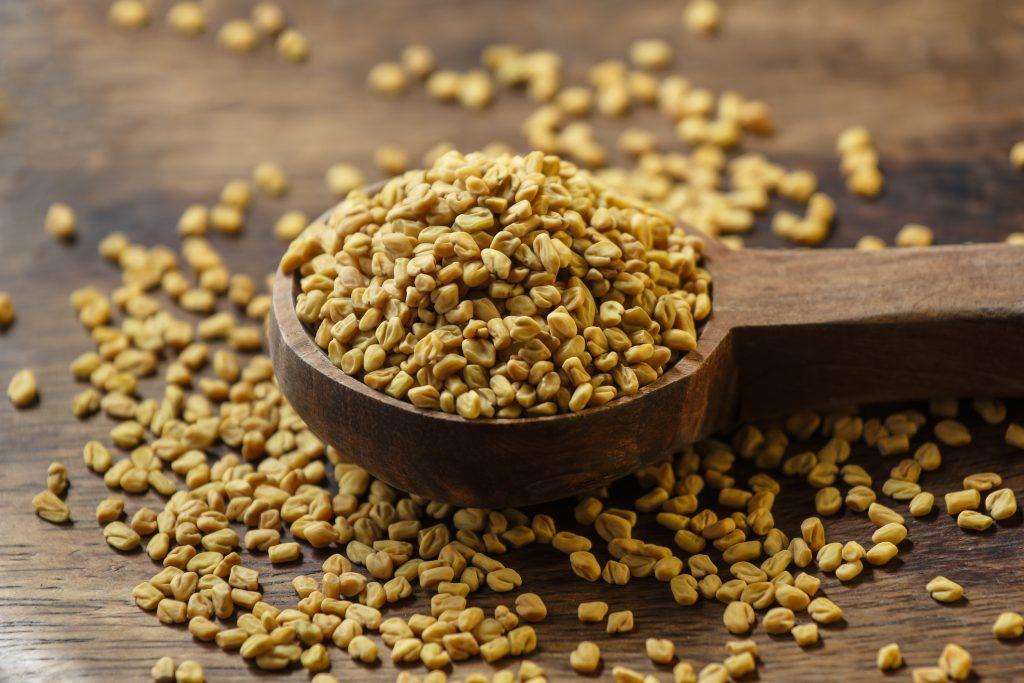Fenugreek belongs to the Fabaceae family; it was also named, Trigonella, from the Latin language that means “little triangle” due to its yellowish-white triangular flower. Fenugreek is a herb that is used in a variety of ways as fresh leaves, dried seeds, twigs, and roots as a spice, flavouring agent, and supplement. It is a common ingredient in Indian dishes and is often taken as a supplement. It is named Methi in Hindi, Urdu, Punjabi, and Marathi, Hulba in Arabic, Moshoseitaro in Greek, Uluva in Malayala, Shoot in Hebrew, Dari in Persian, and Hayseed in English. Fenugreek seeds are widely used as staple spices used in Indian cooking, with a sweet, nutty flavour similar to maple syrup and burnt sugar. It can be incredibly bitter when eaten raw, but when cooked or soaked and combined with aromatics and spices, it transforms and gives a sweetness and depth of flavour to saucy dishes. Fenugreek is a native of South-Eastern Europe and West Asia, now cultivated in India, Argentina, Egypt, and Mediterranean countries (Southern France, Morocco, and Lebanon). In India, it is grown extensively in Rajasthan, Gujarat, Madhya Pradesh, Uttar Pradesh, Maharashtra, and Punjab. It is a cold season crop and is fairly tolerant to frost and very low temperatures. It is best suited for moderate to low rainfall areas and is sown in all types of soil. But the best yield can be harvested from loam and clayey loam soil with proper drainage. It can also be grown on black cotton soils.

Fenugreek has powerful antioxidant properties linked to its health benefits. Fenugreek has a beneficial effect on cleansing the blood and as a diaphoretic, it is able to bring on the sweat and help detox the body. Fenugreek seeds contain a substantial amount of oleic acid, nicotinic acid, linolenic acid, linoleic acid, fibres, glycolipids, phospholipids, choline, and vitamin A, B1, B2, C, and niacin. In addition, it also contains minerals and bioactive compounds that are a powerhouse of benefits. They have anti-cancer, anti-diabetic, hypocholesterolemia, anti-inflammatory effects, etc. Fenugreek seeds have many health benefits such as:-
1. Protects from Cancer:- Fibres present in Methi of Fenugreek Seeds help from cancer. The saponins bind to the toxins present in the food and remove them from the food.
2. Reduces Heart Diseases:- As Fenugreek seeds help control the level of cholesterol in the body, thus it prevents cardiovascular diseases from occurring. The seeds prevent atherosclerosis disease which is the major reason for heart attacks.
3. Maintains Blood Pressure:- Fenugreek contains potassium in rich quantities which helps in controlling the level of heart rate. It even controls the blood pressure levels in the body by nullifying the effects of sodium.


4. Improve Digestion:- Fenugreek seed solves the problem of constipation and indigestion, leading to proper digestion in the body.
5. Relieves Throat Problems:- Taking methi powder or fenugreek seed powder with honey and lemon provides relief from cough and other throat problems.
6. Maintain Body Weight:- By modulating the metabolism of carbohydrates, it acts as a weight loss. Methi or Fenugreek seeds suppress the appetite and increase energy.
7. Improves Skin Health:- The seeds of Methi or Fenugreek help in treating skin problems like scars and burns etc. It provides shiny skin which glows brightly. It also treats other problems like swelling, muscle pain, ulcers, etc. Fenugreek is a great alternative to all the chemically treated creams that usually contain petroleum products and other chemicals. Fenugreek has natural oils that hydrate, moisturize, and soften skin. The potassium, carotene, and vitamin C in the seeds boost skin elasticity and overall health.

bookmarked!!, I love your website!
This is one awesome blog.Really looking forward to read more. Cool.
Very neat blog post.Thanks Again. Great.
Thanks so much for the blog.Much thanks again. Fantastic.
Your determination is motivating! I appreciate your stamina and also resolution to prosper.
You approached the topic from a various angle, giving visitors fresh understanding.
Remarkable! Its truly awesome post, I have got much clear idea regarding from this article.|